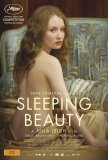Sleeping Beauty (Australia, 2011)
November 02, 2011
Sleeping Beauty is one of those self-consciously artsy motion picture that promises more than it delivers. A fascinating collage of ideas that fails to gel into a movie and collapses under the pretentious weight of the attempt, director Julia Leigh's feature debut wanders into Catherine Breillat territory but without the aggressive assurance the French director brings to her controversial work. At various times, Sleeping Beauty calls to mind a lofty ledger of names: Kubrick, Greenaway, von Trier. Unfortunately, Leigh cherry-picks the worst of those filmmakers rather than the best. The result is weird, off-putting, and clinical.
The title, Sleeping Beauty, was chosen deliberately because of its association with the fairy tale, but there's nothing Disney-like in the movie, which deals primarily with isolation, sexual dysfunction, and gender politics. Those are heady themes and, had they been developed more fully in a well-rounded story, this could have been as engrossing a movie as 2011 has produced. Unfortunately, with an emotional temperature approaching absolute zero, Leigh finds it difficult to accomplish more than present a pastiche of artistic images signifying little.
Emily Browning fans will be delighted with Sleeping Beauty. This is a showcase for the actress, although it's doubtful more than a handful of viewers will see it. As I have previously noted, Browning has an extraordinarily expressive face, and it is used to good effect here. Her performance in Sleeping Beauty has been called "brave," presumably because she's frequently nude and must lie perfectly still while being molested by old men, but on a purely thespian level, she has done better in less ambitious surroundings.
Lucy (Browning) is a college student who lives a shallow life consumed by sex, drugs, and alcohol. With the exception of her only friend, the oddly-named Birdmann (Ewen Leslie), she cares for no one, herself included. She'll take any drug, even when she doesn't know what it is, on the off-chance it will get her high. She'll sleep with anyone willing or with enough money to pay for it. And she drinks vodka like milk. Nothing touches the "real Lucy," if she even exists. In fact, Lucy frequently employs pseudonyms to keep her identity hidden.
She has a number of odd jobs - waitressing at a trendy eatery, making copies at in an upscale office - but they don't pay enough for her to meet the rent. So she turns tricks when the opportunity arises and, when she reads about an intriguing job opening in a newspaper, she inquires. Clara (Rachael Blake), the woman who interviews her, informs her that she's looking for a waitress to serve at an exclusive gentleman's club. Her clients are old and they like having dinner parties while being served by partially nude women. Afterward, for an additional price, they can have an added service. The girl of their choice is given a sleeping draught and, while she is drugged and unconscious, they can use her as a play thing. There are only two rules: no visible marks and no penetration. Not that any of them would be capable of the latter since they are impotent. (One describes in lurid detail the lengths to which he must go in order to achieve an erection.) Lucy accepts the serving job and eventually becomes one of Clara's sleeping beauties.
Leigh's filmmaking style is sparse and straightforward. She favors long, mid-range, static shots. Occasionally, she will do gentle pans with the camera and there is at least one weird conversation in which her subjects stare directly into the lens. Lucy is wrapped in a cocoon of isolation; although this is by design, it makes it difficult to understand or relate to the character, who is held at more than arm's length from the viewer. Only at the end, when the veneer cracks, do we start to believe in her as more than a writer's construct. Moments such as one in which she burns money do not help - that's the kind of thing that only happens in a pretentious movie.
Sleeping Beauty has a lot to say. Most of it relates to the dominant/submissive roles in sexual relationships and the connection between sex and commerce. The problem is that a lot of what Leigh wants to convey gets muddled in the telling. It's possible that in trying to explore too many themes, she leaves even the choicest morsels half-eaten. Lucy's relationship with Birdmann is a case in point. Their interaction is fascinating but it never accomplishes anything more substantive than to say: Lucy is capable of human feeling; she's not completely dead inside. I had the feeling Leigh is trying to make a more profound point, but I was never sure what that point is supposed to be. It's not merely one instance; the production as a whole is rife with such moments.
One you start Sleeping Beauty, however, watching it to the conclusion falls into the compulsory "train wreck viewing" category. You can't turn away. There are too many fertile ideas floating around that, even though few of them germinate with vigor, their existence gives the movie a degree of propulsion. So, although sticking with Sleeping Beauty can be frustrating, it's never boring or uninteresting. I just wish Leigh's concern with being a storyteller had matched that of being an artist with a message.
Sleeping Beauty (Australia, 2011)
Cast: Emily Browning, Rachael Blake, Ewen Leslie
Screenplay: Julia Leigh
Cinematography: Geoffrey Simpson
Music: Ben Frost
U.S. Distributor: Sundance Selects
U.S. Release Date: 2011-10-28
MPAA Rating: "R" (Sexual Content, Nudity, Drugs, Profanity)
Genre: DRAMA
Subtitles: none
Theatrical Aspect Ratio: 2.35:1
- Lemony Snicket's A Series of Unfortunate Events (2004)
- Uninvited, The (2009)
- (There are no more better movies of Emily Browning)
- (There are no more better movies of Rachael Blake)
- (There are no more worst movies of Rachael Blake)
- (There are no more better movies of Ewen Leslie)
- (There are no more worst movies of Ewen Leslie)

Comments